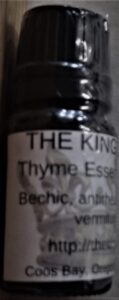
Thyme Essential Oil
Properties: This type of oil is an antispasmodic, antirheumatic, antiseptic, bactericidal, bechic, cardiac, carminative, cicatrisant, diuretic, emenagogue, expectorant, hypertensive, insecticide, stimulant, tonic, and vermifugal substance.
Health benefits: It can be employed to eliminate spasms, give relief from rheumatism by removing toxins, protect wounds from becoming septic, and it kills bacteria. Thyme oil helps to cure chest infections, coughs and colds, is good for heart health, gives relief from excess gas, heals scars and after marks, increases urination, regulates menstrual cycles, and cures coughs and colds.
Here is what I found: A few years ago I had surgery on my wrist due to gangleon cysts left untreated because I like to do everything natural first. It caused some arthritis to form. I used Thyme oil every day until all the symptoms went away.
Now I'm facing similar symptoms in the tibiotalar joints. On the first night I rubbed thyme oil into the tibiotalar joints. When I woke in the morning my foot and joint felt wonderful. I added more. It's relieving as well as warming.
White Thyme Oil: A Comprehensive Overview
Introduction to White Thyme Oil
White thyme oil, extracted from the leaves and flowers of the Thymus vulgaris plant, is a potent essential oil celebrated for its numerous health benefits and aromatic qualities. This oil is a staple in aromatherapy, natural medicine, and even culinary applications, making it a versatile addition to both home and wellness routines.
Extraction Process
The oil is typically obtained through steam distillation, a method that preserves its potent compounds while ensuring purity. During this process, steam passes through the plant material, causing the essential oils to evaporate. The steam is then cooled, allowing the oil to separate and be collected. This careful extraction method results in a highly concentrated oil that retains the plant's natural properties.
Chemical Composition
White thyme oil is rich in several key constituents, with thymol being one of the most notable. Thymol is known for its antiseptic and antimicrobial properties, making white thyme oil an effective natural remedy for various health concerns. Other important compounds found in the oil include carvacrol, linalool, and borneol, each contributing to its unique therapeutic benefits.
For more healthy benefits, usage and disclaimer read MORE.
Health Benefits
- Antimicrobial Properties: One of the primary uses of white thyme oil is its ability to combat bacteria, fungi, and viruses. It can be utilized in natural cleaning products or diffused in the air to help purify the environment.
- Respiratory Support: Inhalation of white thyme oil may alleviate symptoms of respiratory conditions. Its expectorant properties help clear mucus from the airways, making it beneficial for colds, coughs, and bronchitis.
- Immune System Boost: The oil’s strong antimicrobial action can support the immune system, helping the body fend off infections and illnesses.
- Stress Relief: In aromatherapy, white thyme oil is often used to promote relaxation and reduce anxiety. Its warm, herbal scent can create a calming atmosphere, making it an excellent choice for stress relief.
- Digestive Aid: White thyme oil may also aid digestion. It can help relieve symptoms such as bloating and gas when used in a diluted form or in a massage blend applied to the abdomen.
Culinary Uses
In addition to its therapeutic applications, white thyme oil can be used in cooking, albeit in very small quantities due to its potency. It adds a rich, aromatic flavor to dishes, particularly in Mediterranean cuisine. However, caution should be taken, as essential oils are much more concentrated than dried herbs.
How to Use White Thyme Oil
- Aromatherapy: Add a few drops to a diffuser to create a soothing atmosphere. Alternatively, mix it with a carrier oil for topical application.
- Cleaning Products: Incorporate it into homemade cleaning solutions to harness its antimicrobial properties. A few drops in a spray bottle filled with water can effectively sanitize surfaces.
- Massage: Dilute white thyme oil in a carrier oil and use it for a calming massage, particularly on the abdomen to aid digestion.
- Bath: Add a few drops to your bath for a relaxing experience that can help alleviate stress and muscle tension.
Precautions
While white thyme oil is generally safe, it should be used with caution. Always dilute it with a carrier oil before applying it to the skin to prevent irritation. Pregnant or nursing women, as well as those with certain medical conditions, should consult a healthcare professional before using essential oils.
Conclusion
White thyme oil is a multifaceted essential oil that offers a wide array of benefits, from supporting the immune system to enhancing relaxation. Its potent properties make it a valuable addition to both wellness routines and culinary practices. Whether used in aromatherapy, natural cleaning, or cooking, white thyme oil continues to be cherished for its versatility and effectiveness. Always remember to use it responsibly and enjoy its many advantages in your daily life.
It’s always best to use essential oils with caution and to encourage others to do the same. Personal experience and research are key when incorporating them into routines. If you have any questions or need more information about white thyme oil or any other essential oils, feel free to ask!
